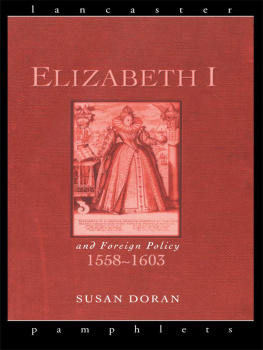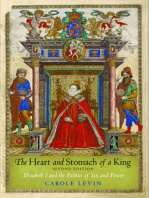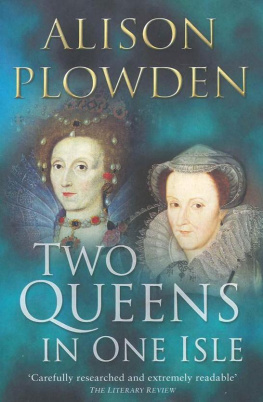Plowden - Elizabeth Regina: the Age of Triumph, 1588-1603
Here you can read online Plowden - Elizabeth Regina: the Age of Triumph, 1588-1603 full text of the book (entire story) in english for free. Download pdf and epub, get meaning, cover and reviews about this ebook. City: Stroud, year: 2011, publisher: The History Press, genre: Non-fiction. Description of the work, (preface) as well as reviews are available. Best literature library LitArk.com created for fans of good reading and offers a wide selection of genres:
Romance novel
Science fiction
Adventure
Detective
Science
History
Home and family
Prose
Art
Politics
Computer
Non-fiction
Religion
Business
Children
Humor
Choose a favorite category and find really read worthwhile books. Enjoy immersion in the world of imagination, feel the emotions of the characters or learn something new for yourself, make an fascinating discovery.
- Book:Elizabeth Regina: the Age of Triumph, 1588-1603
- Author:
- Publisher:The History Press
- Genre:
- Year:2011
- City:Stroud
- Rating:5 / 5
- Favourites:Add to favourites
- Your mark:
- 100
- 1
- 2
- 3
- 4
- 5
Elizabeth Regina: the Age of Triumph, 1588-1603: summary, description and annotation
We offer to read an annotation, description, summary or preface (depends on what the author of the book "Elizabeth Regina: the Age of Triumph, 1588-1603" wrote himself). If you haven't found the necessary information about the book — write in the comments, we will try to find it.
Plowden: author's other books
Who wrote Elizabeth Regina: the Age of Triumph, 1588-1603? Find out the surname, the name of the author of the book and a list of all author's works by series.
Elizabeth Regina: the Age of Triumph, 1588-1603 — read online for free the complete book (whole text) full work
Below is the text of the book, divided by pages. System saving the place of the last page read, allows you to conveniently read the book "Elizabeth Regina: the Age of Triumph, 1588-1603" online for free, without having to search again every time where you left off. Put a bookmark, and you can go to the page where you finished reading at any time.
Font size:
Interval:
Bookmark:
Let us awake my Muse and sing:
It is no time to slumber,
So many joys this time doth bring,
As time will fail to number.
But whereto shall we bend our layes?
Even up to Heaven, againe to raise
The Maid, which thence descended:
Hath brought againe the golden days,
And all the world amended.
Rudeness itself she dothe repine,
Even like an Alchemist divine,
Gross times of iron turning
Into the purest forms of gold:
Not to corrupt, till heaven waxe old,
And be refined with burning.
John Davies,
Hymns of Astrea
Elizabeth Regina
The Age of Triumph, 15881603
The Spanish fleet did float in narrow seas,
And bend her ships against the English shore,
With so great rage as nothing could appease,
And with such strength as never seen before.
It was late in the afternoon of Friday, 19 June 1588 when Captain Thomas Fleming brought the bark Golden Hind scudding under full sail into Plymouth Sound. The Lord Admiral Charles Howard and a group of his senior officers were out on the Hoe relaxing over an after-dinner game of bowls when Fleming came panting up to report that the Spanish Armada had been sighted that morning off the Scillies and Sir Francis Drake, so the story goes, remarked that there was time enough to finish the game and beat the Spaniards too. The story may well be true. The wind was blowing from the south-west and at three oclock the tide had begun flooding into the Sound. Until the ebb, round about ten in the evening, the English battle fleet was effectively immobilised and there could have been plenty of time to finish a leisurely game of bowls.
But all through that night Plymouth harbour seethed with activity as the crews sweated at their gruelling task of towing the heavy warships put on the ebb tide, and by daybreak the bulk of the fleet was riding at anchor behind Rame Head. All through that night, too, the beacon fires flung the news from hill-top to hill-top leaping along the south coast from the Lizard to Beachy Head, up to Bristol and South Wales, across the Sussex Downs to the Surrey hills and the heights of Hampstead and into the Midland shires:
Till Belvoirs lordly terraces the sign to Lincoln sent,
And Lincoln sent the message on, oer the wild vale of Trent;
Till Skiddaw saw the fire that burst on Gaunts embattled pile,
And the red glare on Skiddaw roused the burghers of Carlisle.
The long nervous wait was over and England was as ready as she would ever be to meet the onslaught of Spain. Sir Walter Raleigh and his cousin Richard Grenville commanded in the vulnerable West Country and Sir John Norris, responsible for coastal defences from Dorset to Kent, had detached three thousand men to guard the Isle of Wight, regarded as another key point. In Essex, which would be in the front line if the Duke of Parmas army, now embarking at Dunkirk, succeeded in making the crossing, the Earl of Leicester was gathering fourteen thousand foot and two thousand horse; while in Kent Lord Hunsdon had raised another eight thousand. The inland counties were also doing their bit, if a little reluctantly the imminence of danger by seaborne invasion was naturally harder to impress on men who had never seen the sea. But Sir Henry Cromwell on a visit to London was so struck by the sense of urgency round the capital, by the sight of guarded ferries and crossroads and of men drilling with musket and caliver on every open space, that he wrote home to Huntingdon in a strenuous effort to convey the immediacy of the crisis and ordering all captains and leading gentlemen to stay at their posts, ready to march at an hours warning.
A notably easy-going and unmilitaristic nation was doing its best and no one questioned the courage and resolution of the islanders as they prepared that long-ago summer to defend their lives and liberty, their homes and their religion. Equally, no one with any military experience could doubt that an encounter between Parmas Blackbeards hard-bitten veterans of a dozen bloody campaigns commanded by the best general in Europe and Queen Elizabeths untrained, sketchily equipped citizen army would result in anything but a massacre. The business must be settled at sea, or the country would go down in fire and slaughter, famine, pestilence and persecution. Fortunately, the seamen, although fully conscious of the awesome nature of their responsibility, had every confidence in their ability to hinder the enemys quiet passage into England. Francis Drake, writing to the Queen from Plymouth in April, assured Her Majesty that he had not in his lifetime known better men and possessed with gallanter minds than the people which are here gathered together, voluntarily to put their hands and hearts into the finishing of this great piece of work. The navy, in fact, was itching to get to grips with the Armada.
The two fleets first sighted one another west of the Eddystone about three oclock in the afternoon of Saturday 20 July and during that night the English succeeded in recovering the weather gauge. In other words, they stood out to sea across the enemys bows and, by a very nice piece of seamanship indeed, worked their way round to the seaward and windward flank of the advancing Spaniards. So, on the morning of Sunday the 21st, began the pursuit up the Channel. At the outset both sides had received some unpleasant surprises. The Spaniards by the realisation that they were opposed by ships faster and more weatherly than any they had seen before, and the English by the sheer size of the Armada and the great defensive strength of its crescent-shaped formation. Even with their superior fire-power and manoeuvrability, they knew that unless they could break that formation, it would be impossible to do it serious damage.
On the following day the Armada lost two capital ships, though neither as a result of enemy action. One blew up after a fire started in the magazine. The other lost her rudder and had to be abandoned. On Tuesday the wind veered. The English fleet temporarily lost the advantage of the weather gauge and a somewhat confused battle was joined off Portland Bill, the English trying to weather the Armadas seaward wing, the Spaniards trying to grapple and board their irritatingly nimble adversaries. Meanwhile, Martin Frobisher in the Triumph, the biggest ship in either fleet, together with five middle-sized London merchantmen, had become separated from the main body of the fleet on the shoreward side and was being attacked by Don Hugo de Moncadas galleasses a hybrid form of sailing ship cum galley. Whether Frobisher was really in difficulties or was attempting to lure the galleasses into a trap has never been made clear but, as the wind veered again to the south, Howard in the Ark Royal, followed by the Elizabeth Jonas, the Galleon of Leicester, the Golden Lion, the Victory, the Mary Rose, the Dreadnought and the Swallow, stormed down to the rescue, pouring broadside after broadside into the San Martin de Portugal, the Spanish admirals flagship, as he went. At which assault, reported Howard, after wonderful sharp conflict, the Spaniards were forced to give way and to flock together like sheep.
On Wednesday there was a lull. The English had been using up their ammunition at an unprecedented rate and were obliged to send urgently to Portsmouth for a new supply of such provisions. Howard was not particularly pleased by the way things were going. Whenever the fleets had come to blows the English had had the advantage, but the Armada was now well on its way towards the rendezvous with Parma, still maintaining strict formation and still relatively intact. But on board the
Next pageFont size:
Interval:
Bookmark:
Similar books «Elizabeth Regina: the Age of Triumph, 1588-1603»
Look at similar books to Elizabeth Regina: the Age of Triumph, 1588-1603. We have selected literature similar in name and meaning in the hope of providing readers with more options to find new, interesting, not yet read works.
Discussion, reviews of the book Elizabeth Regina: the Age of Triumph, 1588-1603 and just readers' own opinions. Leave your comments, write what you think about the work, its meaning or the main characters. Specify what exactly you liked and what you didn't like, and why you think so.












